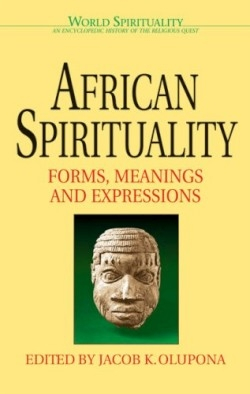African Spirituality
Forms, Meanings, and Expressions
A soul is as resilient and as sure to return as a soccer ball tossed back into the field of play: this sublime metaphor for a West African concept of the soul’s endurance livens up the collection of essays on African cosmology.
Dominique Zahan, from whose essay the soccer metaphor is lifted, sets the tone of the book by explaining that traditional African religion has no concepts of original sin and redemption. That huge departure from what many Westerners see as the basis for Christianity is a gulf of understanding the authors work to bridge.
Issues such as the endurance of traditional African religious imagery and symbolism to the strains of incorporating new religions into old societies are examined. The size of the text reflects the variety of expressions of African spirituality, as the authors discuss not only traditional practices, but the impact of the revealed religions of East and West. The volume is part of an encyclopedic series on world spirituality produced by Crossroad Publishing. Its editor, Jacob K. Olupona, was well-chosen. The book’s major theme is one of religious understanding and tolerance, goals which have become the life work of Olupona. The Nigerian professor, who now teaches at the University of California at Davis, was a leader in the push for multi-faith education in Nigerian schools.
The authors speak with different voices but deliver a similar message: understand what you see before you pass judgment. G.C. Oosthuizen, in his essay on South African religion, makes a persuasive plea for less dogma and more understanding of African modes of modern worship: “It thus becomes disastrous… to produce theology for its own sake. Its usefulness to the religious and cultural situation should be closely analyzed and evaluated. This means that the emphasis is not to be put on the church as an institution but rather on the church as an organism.”
The writers of the twenty essays do a careful and caring job of describing African religious organisms. They help a reader understand not only how religions work, but also why men and women, of Africa or any continent, would let faith rule their lives.
Reviewed by
James Abraham
Disclosure: This article is not an endorsement, but a review. The publisher of this book provided free copies of the book to have their book reviewed by a professional reviewer. No fee was paid by the publisher for this review. Foreword Reviews only recommends books that we love. Foreword Magazine, Inc. is disclosing this in accordance with the Federal Trade Commission’s 16 CFR, Part 255.

